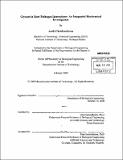Glycans in host-pathogen interactions : an integrated biochemical investigation
Author(s)
Chandrasekaran, Aarthi
DownloadFull printable version (24.81Mb)
Other Contributors
Massachusetts Institute of Technology. Dept. of Biological Engineering.
Advisor
Ram Sasisekharan.
Terms of use
Metadata
Show full item recordAbstract
The epithelial cell-extracellular matrix interface primarily comprises of complex glycans and glycoconjugates. The widespread distribution of these glycans on the epithelial cell surface makes them ideal targets for interaction with microbial pathogens. In this thesis, a framework of integrated approaches was developed to characterize the structure-function relationships of host cell surface glycans and examine their role in mediating hostpathogen interactions. The first part of the thesis involves a study of the effect of secreted bacterial sphingomyelinases on the epithelial cell surface proteoglycan (a large glycan- protein conjugate), syndecan-1 and on epithelial tight junctions. The findings presented in this work suggest mechanisms by which sphingomyelinases could enhance bacterial virulence by regulating epithelial cell function. The second part of the thesis investigates the glycan binding requirements that govern the human adaptation and transmission of influenza A viruses by characterizing the molecular interactions between sialylated glycan-receptors and viral hemagglutinin (HA). The study puts forth the concept that the topology or shape (going beyond the chemical c2-3 versus a2-6 sialic acid linkage) adopted by the sialylated glycans is the critical determinant for efficient human adaptation of these viruses. In conclusion, this thesis provides insights into the molecular mechanisms of host-pathogen interactions and enables development of improved strategies for targeted antimicrobial therapies.
Description
Thesis (Ph. D.)--Massachusetts Institute of Technology, Dept. of Biological Engineering, 2009. Cataloged from PDF version of thesis. Includes bibliographical references.
Date issued
2009Department
Massachusetts Institute of Technology. Department of Biological EngineeringPublisher
Massachusetts Institute of Technology
Keywords
Biological Engineering.